KASH
16TH KEMRI ANNUAL SCIENTIFIC AND HEALTH CONFERENCE
ABSTRACT AND SYMPOSIA SUBMISSION DEADLINE
days
hours
minutes
seconds
KASH 16 THEME
The Future of Health: Scientific Research, Innovations, Technologies and Manufacturing for a resilient UHC
KASH is the KEMRI Annual Scientific and Health Conference launched in 2011 with the mission to: mainstream the scientific and health agenda of KEMRI by Dissemination, sharing and digesting various scientific outputs and other allied products including networking and strengthening Partnerships and collaborations with view to Improving on Health and Quality of life
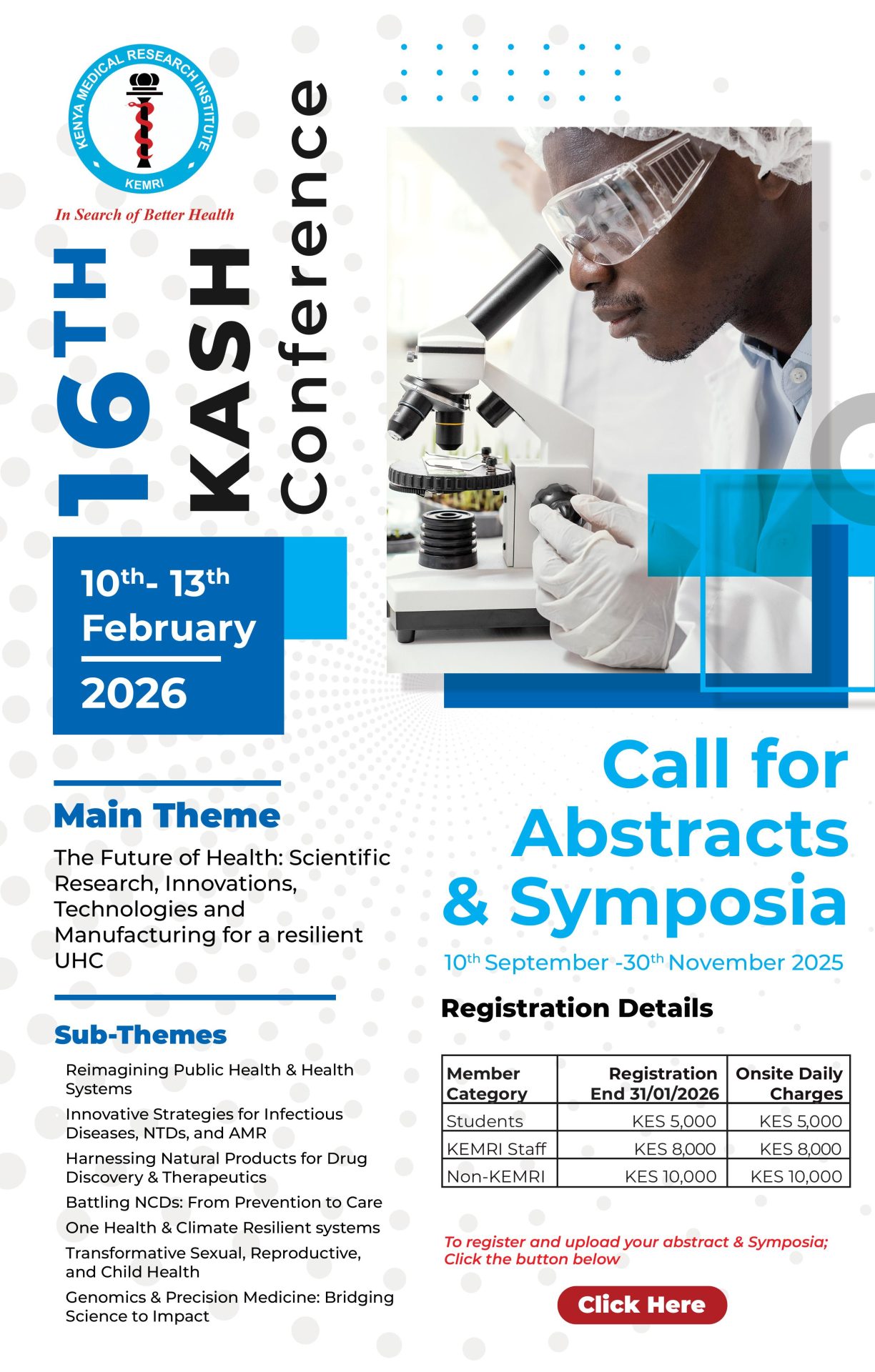
Introduction
KASH is the KEMRI Annual Scientific and Health Conference launched in 2010 with the mission to mainstream the scientific and health agenda of KEMRI by Dissemination, sharing and digesting various scientific outputs and other allied products including networking and strengthening Partnerships and collaborations with a view to Improving on Health and Quality of life of the country’s citizens.
The conference is open to research scientists, health professionals and diploma, graduate and postgraduate students undertaking scientific and health-related courses.
Objective of KASH
1. To disseminate research findings
2. To strengthen research partnerships and relationships with other stakeholders
3. Capacity development for enhanced information sharing and continuous professional development
KASH Conference has transformed KEMRI research dissemination and has become the one annual event on the calendar of KEMRI that all staff, partners from academia, policy and industry, and health practitioners from the region look forward to.
The forum provides a great opportunity for sharing, cross-learning and mentoring of younger scientists as well as a platform for the discussion of current health challenges, the exchange of new knowledge and discussion on the way forward.
KASH 16 THEME
Main Theme
The Future of Health: Scientific Research, Innovations, Technologies and Manufacturing for a resilient UHC
Sub – themes
- Reimagining Public Health & Health Systems
- Innovative Strategies for Infectious Diseases, NTDs, and AMR
- Harnessing Natural Products for Drug Discovery & Therapeutics
- Battling NCDs: From Prevention to Care
- One Health & Climate Resilient systems
- Transformative Sexual, Reproductive, and Child Health
- Genomics & Precision Medicine: Bridging Science to Impact

GUIDELINES FOR ORAL PRESENTATIONS
- All the oral presentations should be prepared using PowerPoint software.
- The maximum time allowed will be 10 minutes per presentation. You should plan to speak for 10 minutes. There will be a Q & A session at the end of each presentation or at the end of all presentations, at the discretion of the session chair.
- It is advisable that authors should have a maximum of 8 slides for a 10-minute presentation.
- We recommend a presentation format of 16:9 (screen size format).
- Make the letters on your slides BIG ENOUGH. The suggested minimum font size is 14.
- Try and put no more than 4 lines of text or 2 images on any one slide.
- Video recording and related media files should be AVOIDED.
- Avoid slideshow animations and effects It detracts from the quality of the presentation to flash numerous graphs, equations, or tables on the screen in rapid sequence to squeeze a presentation into its allotted time.
- The slides should use the slide template provided by the KASH committee on the KEMRI website
GUIDELINES FOR E-POSTER PRESENTATIONS
- The 16th KASH Conference 2026 will have all poster presentations will be displayed electronically (e-posters).
- E-posters provide viewers with a high-quality resolution of images and text. Like traditional posters, e-posters provide a concise snapshot of your work, but instead of a physical poster pinned to a board, e-posters are a single slide presentation that is viewed on a computer.
- E-poster should be submitted as a PowerPoint File (pptx) with an audio narration of a maximum of 5 minutes to accompany it. The narration is captured using the inbuilt recording feature in PowerPoint.
- Your e-poster should be created on a single slide (one slide only) composed in 16:9 ratio (widescreen) using PowerPoint.
- No animations or embedded videos will be permitted.
- Include title, authors, and institutional affiliation at the top of your e-Poster.
- All major sections of your posters should be clearly labeled or highlighted
- Text and legends for figures should be short. Make sure to use large, clear, easy-to-read print for text and legends.
- The use of color adds emphasis and draws interest to the presentation.
SUBMISSION OF ABSTRACT PRESENTATIONS AND POSTERS
Please submit your PowerPoint presentations and E-Posters by 2nd February 2026 to the abstract submission portal.
Please DO NOT email your presentation to the organizers submit it via the abstract submission portal by 2nd February 2026.
NOTE presenters will NOT be allowed to load their presentations at the conference venue. submit it via the abstract submission portal by 2nd February 2026
At the end of the session/conference, all slides will be stored by the KASH Secretariat for future reference. If you have any questions, please contact kash@kemri.go.ke and copy to mmongare@kemri.go.ke
KASH 16 ABSTRACT AND PROGRAMME
COMING SOON
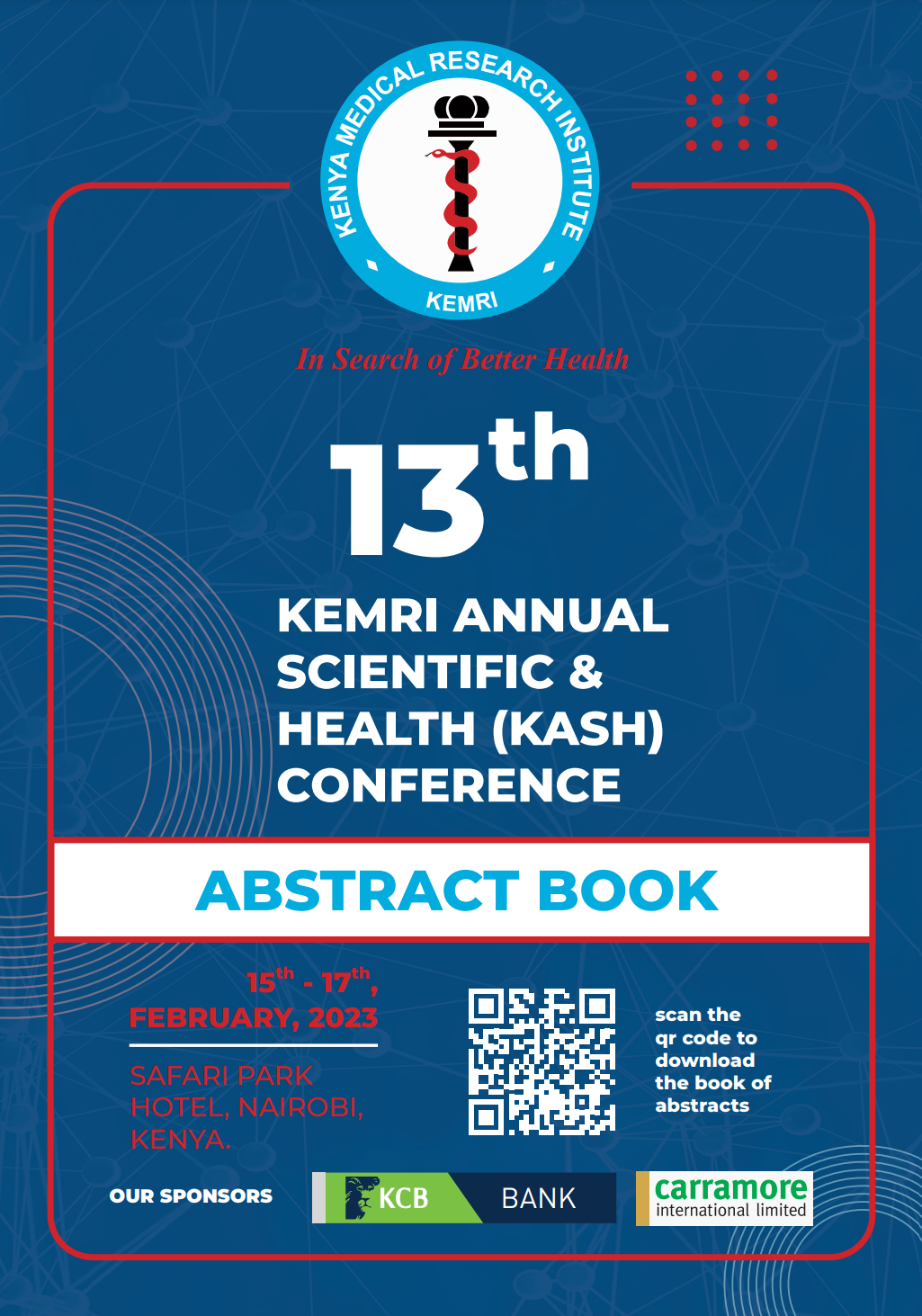
KASH 12 ABSTRACT AND PROGRAMME
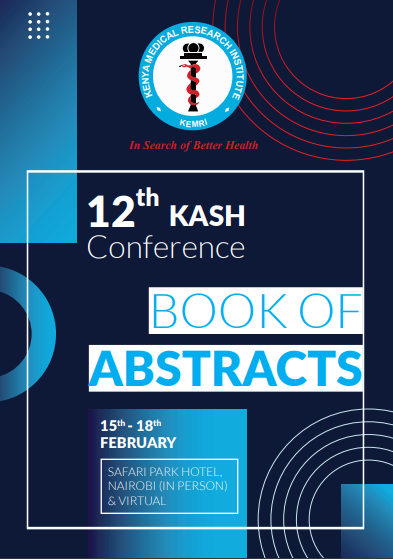
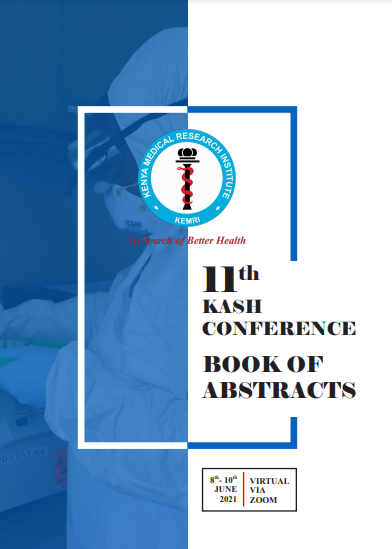
Important Dates and Information
ABSTRACT SUBMISSION
10ᵗʰ September – 30ᵗʰ November 2025
EARLY REGISTRATION
31st January 2026
CONFERENCE DATES
11ᵗʰ – 13ᵗʰ February 2026
REGISTRATION
|
Category |
Registration Ends 31/01/2026 |
Onsite Daily Charges |
| Student |
KES. 5 000 |
KES. 5, 000 |
| KEMRI Staff |
KES. 8, 000 |
KES. 8, 000 |
| Non-KEMRI Staff Members |
KES. 10, 000 |
KES. 10, 000 |
KASH 16 Registration fee is payable to:
NAME OF ORGANIZATION OR PARTNER: KENYA MEDICAL RESEARCH INSTITUTE (KEMRI)
PHYSICAL ADDRESS: NGUMO OFF RAILA ODINGA WAY, NAIROBI, KENYA
NAME OF BANK ACCOUNT: KEMRI Conference
BANK NAME: KENYA COMMERCIAL BANK (KCB)
BANK BRANCH: KIPANDE HOUSE
ACCOUNT NUMBER: 1112776850
MPESA Paybill NO: 522522
CURRENCY OF ACCOUNT: ALL
AC/NO; 1112776850
REGISTRATION FEE IS NON-REFUNDABLE
Abstract and Symposium Submission
The Microsoft CMT service was used for managing the peer-reviewing process for this conference. This service was provided for free by Microsoft and they bore all expenses, including costs for Azure cloud services as well as for software development and support
16th KASH CONFERENCE: GUIDELINES FOR AUTHORS
To help you with your abstract submission, kindly note the following guidelines
- All abstracts must be submitted in English language.
- Abstracts can only be submitted on line via the link provided on the KEMRI web site
- The abstract text should not exceed 3000 characters, use the following format (Background, Methods, Results, Conclusion)
- Tables and graphs may be included as attachments.
- It is the author’s responsibility to submit a correct abstract. Any errors in spelling, grammar or scientific facts will be reproduced as typed by the author.
- Abstracts must not have been published or submitted for presentation to any other national or international meeting.
Choosing Abstract Sub-themes Categories
The abstract sub-themes categories are the general heading under which your abstract will be reviewed and later published in the conference printed matters if accepted. Please choose the sub-themes which best describes the subject of your abstract.
Notification of Acceptance or Rejection
Notification of acceptance or rejection will be sent to the corresponding author. Please note that only the corresponding author will receive mail concerning the abstract and is responsible for informing all co-authors of the status of their abstract. Authors whose abstracts have been accepted will receive instructions for the presentation of their abstract.
Abstract Blinding and Review
All submitted abstracts will go through a blind peer-review process carried out by an independent reviewing committee. The Scientific Sub-committee will post reviewer’s comments to the corresponding authors through emails.
KASH Conference Abstract Policy
An abstract cannot be submitted if it has been previously published or presented, unless there are major updates in the data, and may not be presented elsewhere after acceptance for KASH. If preliminary or partial data has been published, the author is required to indicate the details of the conference, meeting or journal.
KASH Conference Publication
All the accepted abstracts will be published in a special edition of the peer-reviewed African Journal for Health Sciences. If you have any questions regarding your abstract submission, please contact the abstract support team at kash@kemri.go.ke
RISING STAR SCIENTIFIC AWARD CALL
Background
KASH provides a great opportunity for sharing, cross learning and mentoring of younger scientists as well as a platform for discussion of current health challenges, the exchange of new knowledge and discussion on the way forward.
In view of improving the quality of presentations, capacity building and research dissemination from young scientists, KASH has initiated a Rising Scientific Star Award that is open to the young upcoming scientists. The young upcoming scientists are required to apply for this award and submit an abstract on the KASH online portal so that they may be enlisted for consideration by the KASH Rising Star Selection Panel. This Panel has developed the Guidelines and Criteria that is used for nomination and selection of Young Scientist Award which together with the registration form are posted along with the call for abstracts. The young scientists are provided with a forum to make their oral presentations during the Rising Scientific Star Session.
Guidelines, Eligibility and Selection Criteria
- The Young Investigator should be a Kenyan citizen working undertaking his/her research in Kenya
- The upper age limit of the young investigator applying for the award is 40 years for female and 35 years for male investigators.
- Registered/Enrolled in a recognised University locally or internationally as a Post-Graduate Student pursuing either PhD or MSc in any of the 7 Programmatic Areas of KEMRI (kemri.go.ke). Proof of studentship maybe requested by the Panel.
- Should not have won an award during the previous KASH Conferences.
- The abstract/paper submitted must be by the young Investigator as the lead author of paper and the research work must be certified by the Mentor/ Supervisor / Investigator /Head.
- Young Investigator can present only one paper in their oral session.
- Each nominee is required to make an oral presentation (5 minutes) about his/her research work which is rated by 4 independent reviewers. The reviewers will consolidate their marks and rank them according to merit.
Award
The top three presenters; Winner, Runners up and 2nd Runners up will be identified and given an award during the KASH Closing Ceremony.
KASH 16 VENUE
TO BE COMMUNICATED
13th KASH Gallery
12th KASH Gallery
11th KASH Gallery
10th KASH & 40th Anniversary Gallery
KASH
Contact Us
If you have any query please contact
Kash – kash@kemri.go.ke
or
Dr. Damaris Matoke – dmatoke@kemri.go.ke
For any technical issues with uploading abstract please contact
MEET THE TEAM
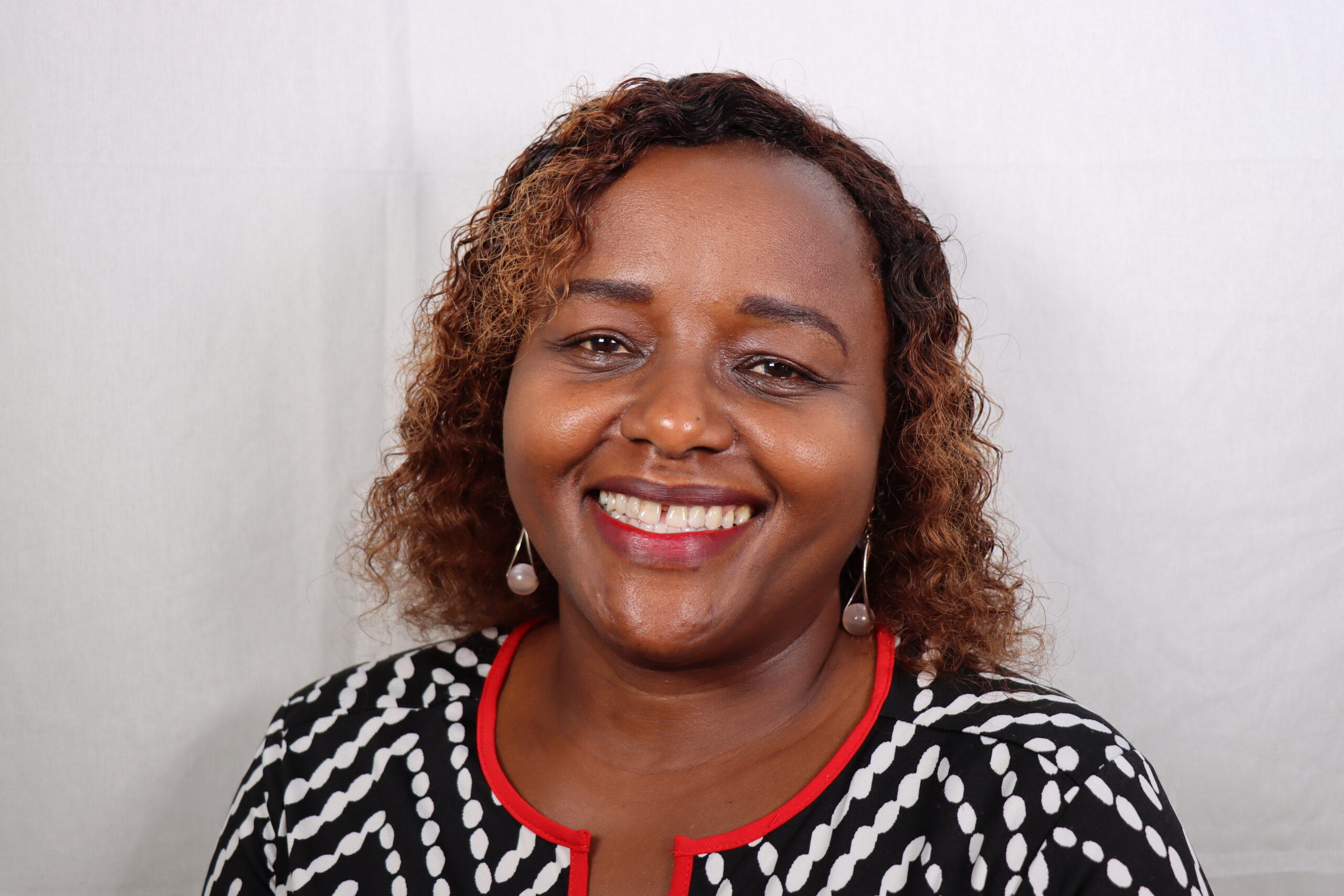
Cecilia K. Mbae, PhD
KASH Chairperson
Dr. Cecilia Mbae holds a Bachelor of Science degree in Biochemistry/Zoology and Masters in Medical parasitology from Jomo Kenyatta University of Agriculture and Technology. She holds a PhD in Molecular and life sciences from the Open University, UK. Her PhD work focused on Molecular characterization of Cryptosporidium and Giardia among HIV positive and negative children living in urban informal settlements in Nairobi. Cecilia Joined KEMRI, Centre for Microbiology Research in 2004 as a Research officer, and is now a Senior Research Scientist in the same department. She is involved in various projects including mapping of salmonella and other enteric infections in Mukuru informal settlements, and is a PI at the Cystic Echinococcossis in sub-Saharan Africa Research initiative (CESSARi), which entails mapping of the disease in different areas and hosts in the participating countries. World Association of Echinococcosis.

Damaris Matoke Muhia, PhD
KASH Organizing Secretary
Damaris holds a Bachelor of Science degree in Biochemistry and Masters in Biotechnology from the University of Mysore, India. She holds a PhD in Molecular Medicine from Jomo Kenyatta University of Agriculture and Technology. Her PhD work focused on population genetics and insecticide resistance of malaria vectors in Western Kenya. Damaris joined KEMRI, Centre for Biotechnology Research and Development, Molecular Entomology laboratory in the year 2006 as an Assistant Research Officer and later rose to the positions of Senior Research Officer within the same department. She is involved in various projects encompassing monitoring of insecticide resistance, mapping of malaria vectors and studying of behavior changes of mosquitoes and sandflies in relation to vector control systems in Kenya. Damaris is a member of the Pan African Mosquito Control Association (PAMCA).

Charles Mwaniki Mbogo PhD
KASH Committee Member
Charles is a public health entomologist with over 30 years’ experience in the conduct of entomological studies in Kenya, Ethiopia and Eritrea. He is a Chief Research Scientist at the Kenya Medical Research Institute (KEMRI) and the KEMRI-Wellcome Trust Research Programme. He heads the Vector Biology and Ecology Department and the Vector Public Health unit at KEMRI Wellcome Trust, Nairobi. He pioneers research in the ecology and behaviour of mosquitoes and other disease vectors. He has developed and implemented vector surveillance systems at local and national scales in the Eastern Africa region. He serves on various national and international technical committees and maintains a keen interest in translating research into policy and practice. He maintains a keen interest in translating research into policy and practice and played an important role in the formulation of national policy on Integrated Vector Management (IVM). He is the current President of the Pan African Mosquito Control Association (PAMCA), an association of African entomology professionals dedicated to Improving human health through suppression of mosquitoes and mosquito borne diseases.

Dr. Joseph Mwangangi, PhD
KASH Committee Member
Joseph Mwangangi graduated with BSc (Zoology, Botany and Geography) from Kenyatta University in 1997. He joined KEMRI in 1998. Mwangangi graduated with PhD degree in Medical Entomology from Kenyatta University in 2007. His research interest is in malaria vector biology and ecology, novel approaches to the control of vector borne diseases and the monitoring of insecticide resistance. His current research interests include IVM within a community based model, empowering communities and public health stakeholders in disease control. He is TWAS Young Affiliate Fellow for Academy of Sciences for the Developing World (TWAS) and the TWAS Regional Office for Sub-Saharan Africa (TWAS-ROSSA) for period 2011 – 2015. He is an Official for the PAMCA, Kenyan Chapter and member of coordinating committee for PAMCA.

Carolyne Wandera
KASH Committee Member
Carolyne Wandera holds a Bachelor’s degree in Commerce Marketing Option (First Class Hons) and a Masters in Business Administration from the University Of Nairobi. She is also a certified Lead Auditor in ISO 9001:2015. Her interest is in Communication and Quality Management Systems. Currently working as senior Corporate Communications Officer at the Institute, she is involved in the publicity of the Institute and dissemination of research output.


